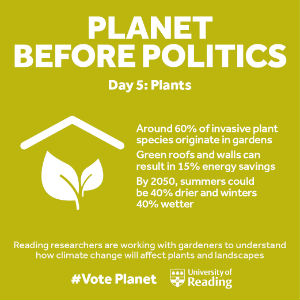#VotePlanet: Plants ‘need a helping hand to overcome climate challenges’
07 December 2019

Climate change is already altering landscapes and researchers at the University of Reading are exploring how they might look several decades into the future.
Plants make up 80% of the world’s living matter. With changes to temperatures and rainfall globally forcing nature to adapt, Reading research is revealing which plants are suffering or thriving as a result.
Global analysis in partnership with the Royal Horticulture Society (RHS) and collaborations with education policy experts and gardeners in the UK are just some of the ways Reading is finding answers to pressing issues.
Dr Alastair Culham, a leading botanist at the University of Reading, said: “Understanding plants is important to the future of all sorts of popular foods, such as chocolate, coffee, tea and fruits we enjoy eating every day.”
“We are celebrating 50 years of botany research at the University of Reading, during which time we have helped answer questions about how we can give plants a helping hand to overcome climate challenges and how to better inform the next generation about plants.”
Scientists at the University of Reading supported the RHS in producing its Gardening in the Changing Climate report in 2017. It warned hotter, drier summers and wetter winters could changing Britain’s plush parks and village greens to dusty, brown meadows, and allow new pests and diseases to emerge.
The emergence of new invasive plant species due to a changing climate is now a problem. Biological Sciences PhD student Tomos Jones is monitoring which species are beginning to show invasive characteristics with the help of gardeners who have responded to his survey.
Tomos and the team at Universoty of Reading also won a gold medal at this year’s Chelsea Flower Show for their stand educating gardeners about invasive ornamental plants.
A project measuring the importance of a wild-harvested yam to people in southern Zambia found there is a high dependence on the plant for food and income, demonstrating the importance of reducing deforestation and improving how land is managed.
Other Reading research has shown indoor plants can improve air quality in offices and homes, as they remove carbon dioxide and increase humidity. The student-led #MyGreenStudy campaign launched on December 5th has already given away nearly 250 houseplants to students to improve their living environment. These plants were propagated locally and grown in peat-free compost.
A recent symposium hosted by the University of Reading brought together teachers and experts to discuss ways to improve teaching children about plants, with many unable to identify common species.
Reading botanists also provided support to local allotment holders, passing on tips to help them make the most of their plots, and have published advice on when to water plants during hot weather.
#VotePlanet
The University of Reading’s #VotePlanet campaign is highlighting the biggest threats facing the UK and global environment, as well as how research and action can combat them, in the lead up to the General Election on December 12.
Public concern for the environment has increased significantly in recent years, with political parties unveiling various eco-friendly pledges in their election manifestos.
The #VotePlanet campaign therefore aims to inform voters on the science behind these issues, and what sustainability action it is taking as an institution.
Follow the campaign on Twitter, Facebook and Instagram, and on the University news page. Get involved and share your examples of sustainable action using the hashtag #VotePlanet.
